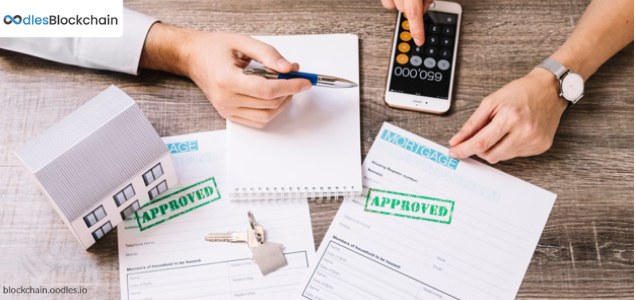-
When we hear the words blockchain and mortgage, we generally think of buying a house or a piece of property with cryptocurrencies. However, beyond that, blockchain technology solutions can be beneficial for the real estate industry, especially across mortgage processes. Maybe not in the ways you would expect. Attorneys draft legal papers, title firms perform title searches, and underwriters determine the loan's risks. It renders the mortgage process a lengthy and often strenuous experience for consumers.
Blockchain technology may be able to support and optimize mortgage lending efficiently. Technology is often analogous to business process improvement software. Indeed, it can enhance the mortgage process.
Introducing Blockchain Technology to the Mortgage Industry
There's a real need to increase accountability, traceability, and recordkeeping throughout the mortgage process, and blockchain could help with that as a transparent, distributed ledger.
The creation of this safe chain of information would assist in the resolution of issues with document transfers between parties and the reduction of mortgage fraud. Blockchain technology can fundamentally alter the process by which consumers buy a home, as well as the way financial institutions handle mortgages, according to a 2016 PWC report on using blockchain to improve the mortgage process. The technology could, for example, reduce costs and complexity in the process, build infallible and incorruptible transaction records, and allow near-instantaneous settlement.” Using blockchain technology in mortgages could also help with a range of other aspects of the lending and home-buying process.
Also, Read | Blockchain P2P Lending Platform | Revolutionizing Lending
Streamlining Document Tracking and Record-Keeping
If a buyer applies for a mortgage, a variety of parties — lenders, credit companies, bank staff, and other third-party agents — may require access to the buyer's details and financial records to determine if the loan should be authorized. The most popular method of exchanging these documents is by email or fax, with one party requesting access to another. The document transfer can take a few days, and a signature is required to confirm receipt.
This manual record monitoring process is not only time-consuming but also leaves the door open to records being misplaced or lost due to human error. Using blockchain technology, any tracking problems could be resolved, and the passage of documents from one party to another could be simplified using digital IDs, as well as automated tracking and updating.
Blockchain technology is decentralized, thus, every participant gets access to a similar record of information. With appropriate permissions, they can access the information whenever required in real-time without complex handoff processes.
Also, Read | Advancing Identity Management with Blockchain Technology
Reducing the Likelihood of Mortgage Fraud
Blockchain can significantly reduce or even eliminate mortgage lending fraud. Real estate is one of the economically influential industries. Thereby, it makes it ripe for fraudsters. Additionally, the traditional paperwork process enables points of failure and access to fraudulent documents by these scammers.
Because the data remains encrypted on the blockchain database, it is difficult to file fake paperwork or tamper with financial documents. As a result, this information is much more secure — and thus, anyone is less likely to be able to tamper in an attempt to commit fraud.
By putting protocols in place to verify submissions, blockchain would help reduce the use of fraudulent documents to perpetrate these scams. Furthermore, if a concern about document tampering arises during the process, it is simple to track and provide indisputable real estate data about the information's origins to demonstrate otherwise.
Also, Read | Preventing Fraud with Blockchain
Contracts getting Smart
During the mortgage process, blockchain technology can create and support smart contracts. Smart contracts are self-executing contracts on the blockchain. Developers write the terms of an agreement of contract in the lines of code. Further, it operates without the need for human intervention.
All parties verify these contracts with their electronic signatures. Changes are possible when something specific occurs, implying that the contracts are created automatically and in real-time — with the inclusions and exclusions required for that transaction. You can use the code to automate the return of earnest money if a contract falls through, or to determine when and how to transfer money for the down payment.
If all conditions meet, it automatically executes and completes the respective transaction. Both parties receive notifications upon reaching certain milestones during the process. For instance, when a buyer makes a down payment.
These smart contracts can be viable to use in other scenarios. Smart contract solutions, for instance, would be useful in situations where loans are sold into mortgage-backed security pools for investors to purchase. Some loans are ineligible for this use. Blockchain technology with smart contracts can automatically exclude any loans that do not meet the criteria based on the code.
Reducing Processing Times
Traditional mortgage applications require a lot of paperwork and can take anywhere from 45 to 60 days to complete. According to a PWC report, the average mortgage application is about 500 pages long. A slew of different intermediaries, including attorneys, appraisers, brokers, agents, underwriters, and others have reviewed this report.
However, when you cut out the middle man, which there are many in the mortgage process, transactions are always faster. This is exactly what recording mortgage agreements on the blockchain does, while also allowing lenders and buyers to interact directly. It also eliminates paper documents. It replaces them with a single source of information. Both parties can access this source of information in real-time for validation.
There is no middleman to manage the transaction. There are no piles of paperwork to pass back and forth between various parties involved in the process. It dramatically accelerates the time frame in which things can happen.
For more information about using blockchain for mortgage lending solutions, connect with our blockchain development experts.

Our Offices
INDIA
Emaar Digital Greens, Sector 61,
Gurugram, Haryana
122011.
Welldone Tech Park,
Sector 48, Sohna road,
Gurugram, Haryana
122018.














